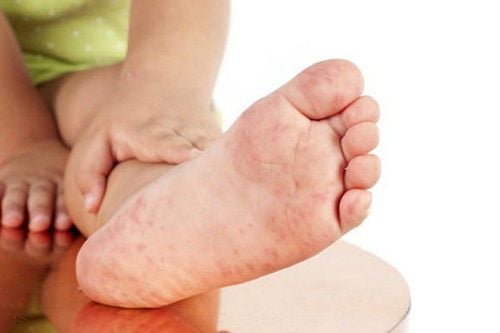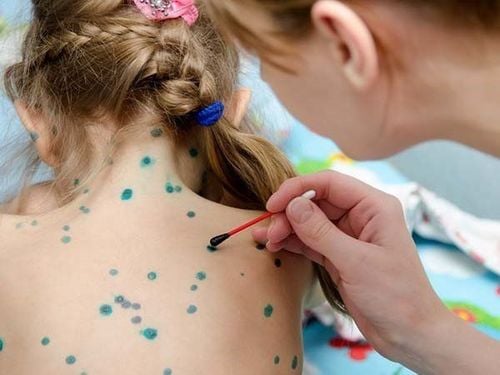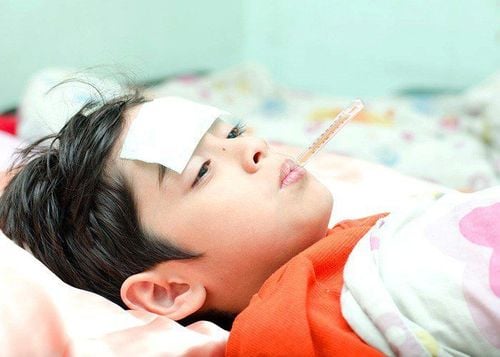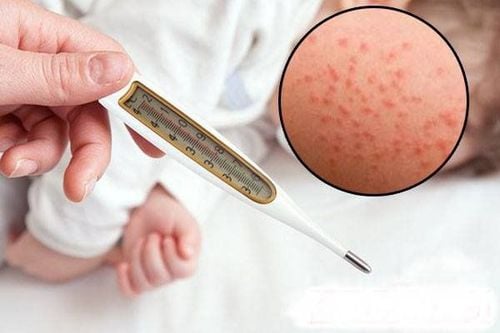In reality, measles can affect individuals of any age. In particular, measles in adults can easily lead to complications due to subjective factors. To understand more about measles in adults, please continue reading the following article.
1. Symptoms of Measles in Adults
Adults rarely contract measles because most have been infected during childhood and developed immunity. However, some adults still contract measles due to a lack of immunity.After infection, the incubation period lasts between 7-21 days (averaging 10 days), after which the disease manifests with specific symptoms. The symptoms of measles include:
- High fever, fatigue, loss of appetite, headache.
- Upper respiratory tract inflammation (dry cough, nasal congestion, runny nose).
- Red, irritated eyes, tearing, photophobia, swollen eyelids.
- Inside the oral cavity, on the buccal mucosa (opposite the upper molars), small white/gray spots (Koplik spots) measuring 0.5-1 mm in diameter with a surrounding red halo can be observed.
- Rash appears 3-4 days after high fever, presenting as raised pink lesions that begin behind the ears, spreading to the nape, forehead, face, neck, then progressing to the trunk and limbs, including the palms and soles. As the rash covers the body, the fever gradually subsides.
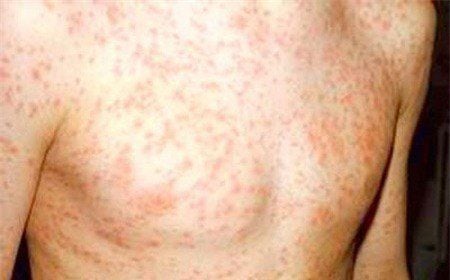
2. The Dangers of Measles in Adults
Unlike in children, measles in adults can cause severe complications such as encephalitis, paralysis, seizures, and cognitive impairment. The mortality rate among patients with complications is relatively high, reaching up to 15%.
Pregnant women are also at risk of contracting measles if they are exposed to the source of the disease. The measles virus can cause miscarriage, stillbirth, premature birth, or low birth weight, congenital abnormalities, or primary measles infection in the fetus. In the first months of having measles, congenital abnormalities in newborns can be as high as 50%. In the second month of contracting measles, congenital abnormalities will be 22%, and in the third month, 6%.
Note that pregnant women cannot get the measles vaccine, although there is currently no evidence of congenital abnormalities in children whose mothers received the measles vaccine during pregnancy. Therefore, pregnant women should wear masks when going out, wash their hands frequently, and disinfect their nose and throat. Pregnant women should eat nutritious foods to increase resistance and keep their living environment clean, airy, and hygienic.
More worrisome, the sequelae of measles in adults are often not recognized in time to be prevented. Usually, after the fever and rash subside, some patients think they have fully recovered. But subsequently, a high fever returns, accompanied by headaches, seizures, altered consciousness ranging from confusion to coma, possible limb paralysis, and sphincter dysfunction, which indicates complications have progressed to meningitis or myelitis, along with other severe complications like pneumonia, bronchial pneumonia, and keratoconjunctivitis leading to corneal ulcers and blindness.
Health experts note that because measles is commonly thought to only occur in children, adults often take it lightly when they contract measles, lacking isolation measures, proper nutritional care, and good hygiene. This is the reason the disease easily spreads in the community and can lead to severe complications.

3. Essential Considerations in Treating Measles in Adults
Treatment principles:
- Treat the occurring symptoms and combine patient care, including personal hygiene and nutrition through diet.
- Detect complications early to proceed with treatment.
- Specifically, for measles, if there are adequate care and isolation conditions, the patient can be cared for and treated at home. It is necessary to note that poor hygiene and nutrition can help improve the condition. The patient needs to maintain oral hygiene, eye hygiene, and personal hygiene. Additionally, the patient's diet should be supplemented with vitamin A. According to research, supplementing with vitamin A can reduce measles mortality by 50%. Furthermore, vitamin A deficiency can cause complications such as corneal ulcers and even blindness.
When the patient has a high fever, quick measures are needed to reduce the fever, and the patient should be kept in a cool place, avoiding drafts. The patient should be given enough water and additional fruit juices to avoid dehydration due to high fever.
- Isolate measles patients: It is recommended to minimize meeting and contact with others, including family members. If a caregiver is needed, they should wear a mask regularly to prevent the spread of the disease
4. Early Detection of Measles Complications in Adults
To prevent complications of measles, it is necessary to note and monitor the following symptoms in patients:
- Monitor the patient's temperature in two cases: the patient no longer has red spots on the skin but still has a fever, and the patient has subsided the fever but then has a fever again.
- The patient suddenly coughs, with increasing frequency of coughing or a hoarse cough, and the patient begins to feel more tired.
- The disease becomes more severe, and the patient has symptoms such as abnormal breathing, fast heartbeat, and increased drowsiness.
If the patient experiences these symptoms, it is necessary to examine them to detect complications and provide timely treatment quickly.
5. Treatment of Complicated Measles in Adults
When measles in adults has led to complications, consider the following:
- Patients should receive treatment and care at district-level hospitals or higher.
- If the patient develops bacterial complications, antibiotics should be used accordingly.
- If the patient has encephalitis complications, anti-inflammatory, anti-edema, and anticonvulsants should be used.
- Other treatments and care that can be performed include electrolyte rehydration and sputum aspiration. Oxygen therapy or respiratory support if respiratory failure occurs. Nebulization should only be applied in special cases such as severe laryngitis or laryngeal edema.
Conclusion: Adults often underestimate measles and think they will never contract the disease. However, measles in adults is also very dangerous, even causing death if complications occur. Therefore, when contracting measles, we should go to a medical facility for treatment advice and to avoid infecting others.
Vinmec International General Hospital is currently providing vaccination services with a variety of vaccines for different subjects, from infants, young children, adults, and women before and during pregnancy. Among them is the MMR II & Diluent Inj 0.5ml vaccine from MMD in the USA. The vaccine is imported and stored in a modern cold storage system, with a cold chain system meeting GSP standards and keeping the vaccine in the best conditions to ensure quality. Multi-specialty monitoring before, during, and after vaccination at the Vinmec Health System and always having a rescue team ready to coordinate with the vaccination room to handle cases of anaphylactic shock, respiratory failure, and cardiac arrest, ensuring timely and correct protocol handling when an incident occurs.
Please dial HOTLINE for more information or register for an appointment HERE. Download MyVinmec app to make appointments faster and to manage your bookings easily.
To arrange an appointment, please call HOTLINE or make your reservation directly HERE. You may also download the MyVinmec app to schedule appointments faster and manage your reservations more conveniently.


